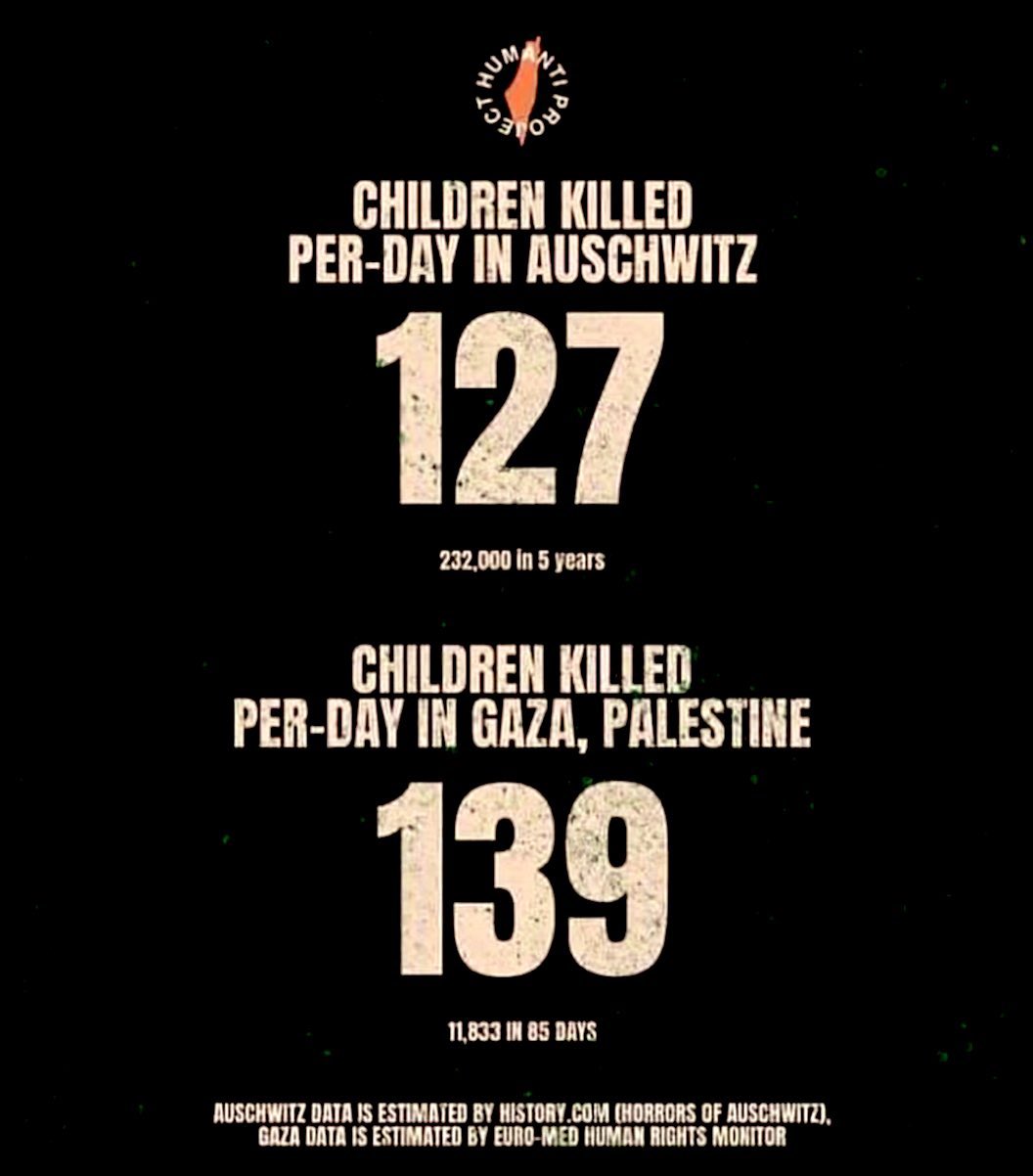My conversations during the Second Nakba have been interesting, disturbing, and revealing in many ways. At the moment, I’m thinking about all the ethicists and Christians and other “good people” who voted for a President who is complicit in a case of genocide undergoing trial at the Genocide Convention of the International Court of Justice. It will be difficult to erase all the pictures of Americans with the Star of David flag on their cars, clothing, and front lawns–which will be seen by those in the future like we see those who waved their swastika flag from the 1940s.
And I suppose that introduces the first reflection: that the respectable, the liberal, the educated justified genocide. This was the case in Nazi Germany, of course, and in other cases; architects, engineers, doctors, pastors, professors and academics, researchers, people within respectable upper middle-class families that went to all the right fancy universities. They were Nazis. Not monsters, maniacal groups you could necessarily spot on the road. They were not bands roaming the fields who never trimmed their beards. But rather well-shaven, clean people with clean houses that you would confide in and trust, and through social mechanisms of good reputation. It’s the same for Americans as well, especially white liberals, who imagine that their country and President is in some way respectable and would never do any serious harm to such a massive and vulnerable population (despite being genocidal for 300 years and enslaving millions of people; Germany, France, and Britain imagine that they would not support a genocide in the 21st century, despite carrying out multiple genocides on multiple continents in just the last 100 years).

Harvard, Yale, Stanford, the New York Times, the Democratic Party, all of these respectable institutions, are deeply committed to one version of reality (national security, protecting “civilization,” “American democracy,” etc.), despite the reality on the ground (the slaughter of 1,000 children per week since October; the intentional cutting off of water and food to 2.2 million people who are now suffering the most efficient forced-famine in modern times, possibly ever; gross violations of virtually all major international laws, including the Geneva Conventions, Rome Statute, and Genocide Convention).

The second realization is how radical the ethical framework of human rights actually is. When I first read the United Nations Declaration of Human Rights (1948), I saw it as less universal than most; everyone is entitled to “periodic vacation”? It seemed very European. And of course, it was and is. And yet, the general concept of human rights does, in fact, transcend such particular times and cultures. It can be found in multiple religious traditions and in many centuries and millennia past.
The basic idea is this: humans are entitled to certain things. Rights, or “normative social bonds” (Plantinga), form a basis for ethics, society, and stability in the world. And here’s the kicker: it does not apply to some humans more than others. It applies to the group.
It turns out that very, very few people believe this. Because, at least in my experience, the arguments justifying genocide in Gaza are extensive and they all surround the idea that some people don’t have human rights. In fact, almost all of the Zionists I have spoken with and heard from do not really deny Israel’s genocidal actions, but rather provide justifications for them (“but Hamas….” “human shields…” “threat to the west…” “terrorist organization…” “October 7…” “The hostages must be released…” etc.) None of these are arguments against Israel’s genocide of Gaza, they are justifications for it. The most compelling case by South Africa at the Genocide Convention has been intent; Israel’s officials are explicit that Palestinians have no human rights and that they deserve displacement and death. They reiterate this over and over, in almost every way imaginable without actually saying the specific phrase, “Palestinians have no human rights” (probably because they are so unfamiliar with such concepts or least the language).
Human rights frameworks seem to be undermined by all sides involved in a serious conflict, and this problem seems to play into the “cycles of violence.” Let’s take the “right to be free from torture” or violence, for example. From a human rights perspective, who has the right to be free from torture?
- Americans have the right to be free from torture.
- Short people have the right to be free from torture.
- Muslims have the right to be free from torture.
- Palestinians have the right to be free from torture.
- Pastors have the right to be free from torture.
- Soldiers have the right to to be free from torture.
- Babies have the right to be free from torture.
- Social Democrats have the right to be free from torture.
- Those who commit torture have the right to be free from torture.
- Terrorists have the right to be free from torture.
If you hesitate to affirm any of these, then you may want to reconsider whether you actually understand human rights.
Consider this last one, because the political purpose of “the terrorist” is actually to create a category in which human rights no longer apply. “We can kill terrorists without second thought, because, well, they’re terrorists.” What do drone bombers tell themselves as they kill people on the computer screen? “They’re terrorists, so they’re not innocent, so they can be killed in any way and in any amount we want.” As I’ve written elsewhere, “terrorist” is often used by western imperialism as “anyone who resists American policy,” or “anyone who resists our economic expansion and colonial efforts.” Whether that’s Native Americans fighting against Custer, or Mandela fighting against apartheid, or Hamas fighting against Israel, they are all branded “terrorists” by the colonizer and can be killed, or tortured, or whatever, without second thought. Nevermind that the colonized are undergoing extermination–and even have the right to resist according to international law (1990):
Deeply concerned and alarmed at the deplorable consequences of Israel’s continuing acts of aggression against Lebanon and its continuing occupation of parts of southern Lebanon, as well as its refusal to implement the relevant resolutions of the Security Council, in particular resolutions 425 (1978) of 19 March 1978,
1.Calls upon all States to implement fully and faithfully all the resolutions of the United Nations regarding the exercise of the right to self-determination and independence by peoples under colonial and foreign domination;
2.Reaffirms the legitimacy of the struggle of peoples for independence, territorial integrity, national unity and liberation from colonial domination, apartheid and foreign occupation by all available means, including armed struggle;

The concept of the terrorist, in this way, is anti-human rights to the core. It’s very purpose is to dehumanize in order to legitimize violence. “Terrorist” is just one of many ways in which human rights are side-lined. There are countless other words and imaginary categories that people create in order to deny people their rights.
IDF soldiers have the right to be free from torture. Yes, even after they themselves have tortured many a person, have tortured and killed countless children in the past 75 years in the longest and most brutal military occupation in modern history. Netanyahu and his supporters who call for the genocide of all in Gaza, have human rights as well. Like the leaders of Hamas, they should never be tortured, for the same reason the children of Gaza should never be tortured, and for the same reason Hitler and Mother Theresa and Trump and Malcom X should never be tortured. While important categories like “colonizer” and “colonized” greatly shape ethical judgments, there are generally not two categories in our species: “bad people” and “good people.” That distinction is itself the very opposite of a human rights perspective. It is also factually wrong. There do not exist “good” and “bad” people in the world, at least in a simple, permanent, binary way. People create justifications for this simplistic perception, but that doesn’t mean it is anything more than a perception. “The line of good and evil runs through every human heart.”
This is why the film Downfall (2004) is so powerful and disarming. It humanizes Adolph Hitler. It demystifies him. It makes him one of us–precisely because he is one of us. He’s not “less than human.” (That’s why I never “like” or boost social media posts that call anyone “monsters” “less than human” etc., because this is dehumanizing language that ultimately undermines human rights and empowers the oppressor.) That’s scary as hell to us, because we realize, “oh my, here is a person who is not just an immoral person, but a creature of circumstances that is acting out of societal conditions, supported by all kinds of legal, social, religious, cultural activities…Any one of us could have been Hitler.”
Exactly. You and I could have done what Hitler did. He is not in a category of his own. Not at all. Every day, we carry the psychological potential to make the kinds of choices he did; the major difference is we don’t live in Nazi Germany, in that time, place, culture, etc. And we also don’t have his power and its peer pressures. Hitler made “reasonable” choices given the culture and time and place, and within the position of power in which he found himself. We know this, of course, because he didn’t act on his own. He had millions of supporters in and outside of Germany, and acted on behalf of his political and capitalist donors.
As Jewish linguist and author Noam Chomsky put it, “Education is not memorizing that Hitler killed 6 million Jews. Education is understanding how millions of ordinary Germans were convinced that it was required.”
And that’s also what’s so disturbing about Germany today, who are arresting Jews on the street for holding signs “stop genocide!” They are also punishing people in Berlin simply for mentioning the 1948 Nakba, in which Israel killed hundreds and displaced 750,000 people from their homes (many of who remain in Gaza today). Germany’s efforts to educate itself out of genocidal worldviews–and scapegoat Arabs and commit genocide against them–has not worked. And more relevant for this essay, Germany has adopted a perspective on the holocaust that is fundamentally opposed to human rights. Their view is basically: (a) the holocaust and anything like it can never happen again (so no worries! It’s behind us; we’re all safe now); (b) Jews and the state of Israel could never commit a genocide, because they endured one of the worst, or the worst, in history.
Both of these mythologies or fictions oppose human rights. Human rights makes no such distinctions about people and their capability of evil, nor does it place boundaries as to how much evil can happen in the future. Furthermore, (a) and (b) together legitimize the worst of all evils for certain groups of people, and also increases the probability of such violence happening in the future. This approach distances us from the past so that, once again, we do not recognize the problem of racism and systemic violence when it is the very atmosphere we breathe. When events and figures like the Nazi holocaust and Adolph Hitler reach legendary status, they become legends. And if legends, not really real. And if not really real, what lessons can really be learned?
A general human rights framework also does not engage in the kind of moral calculations as utilitarian or other ethical frameworks. There are entitlements and infringements. There are some rights more important than others, but everyone generally has them.
Conclusion
So, hopefully you can see it then: human rights is a radical idea (almost as radical as animal rights, which I also support), and that’s the reason I’m writing this: to show that, if legitimate, human rights is up for grabs and being compromised in fundamental ways by so many actors today. The European Union and United States are directly supporting and financing the most grave human rights violations imaginable right now, in February 2024. That is a fact. They are violating the laws that were directly created in response to the Jewish holocaust. Human rights is not an adequate framework in and of itself to gauge the ethics of every decision; multiple lenses are needed. But it is a fairly clear bar for what should be decent human behavior. “Genocide wrong,” “torture bad,” these seem primitive. But, then again, apparently so does our species who has not learned these basic moral lessons. Not learned much of it, at all.
We once again must rely on the East, the Global South, and the “barbaric” to understand how barbaric and uncivilized we are, as western people still feasting on the great capital and wealth we’ve accumulated from 500 years of stealing other people’s land and labor. (Note also: 40,000 Americans now live in the West Bank–an illegal settler colony ruled by Israel in the land of Palestine.) Palestine is, after all, in Chomsky’s words, “the last phase of European colonialism.” You’d think we could give up that small strip of land. But, no. There’s gas off the coast and beachfront property in Gaza–and a massive military apparatus to put it into private investors’ hands. So why not. There’s just 2.2 million people that have to be “voluntarily” moved.
Israel and the United States are also now at war with the United Nations and its highest court, the International Court of Justice, precisely for his reason: the UN was created with the UN Declaration of Human Rights at its center, and that is what is being undermined by genocidal acts, like turning off the water to 2.2 million people. We all hope that the civilized world will prevail over the world of professional terrorism, and that the most basic of human rights will be enforced.
